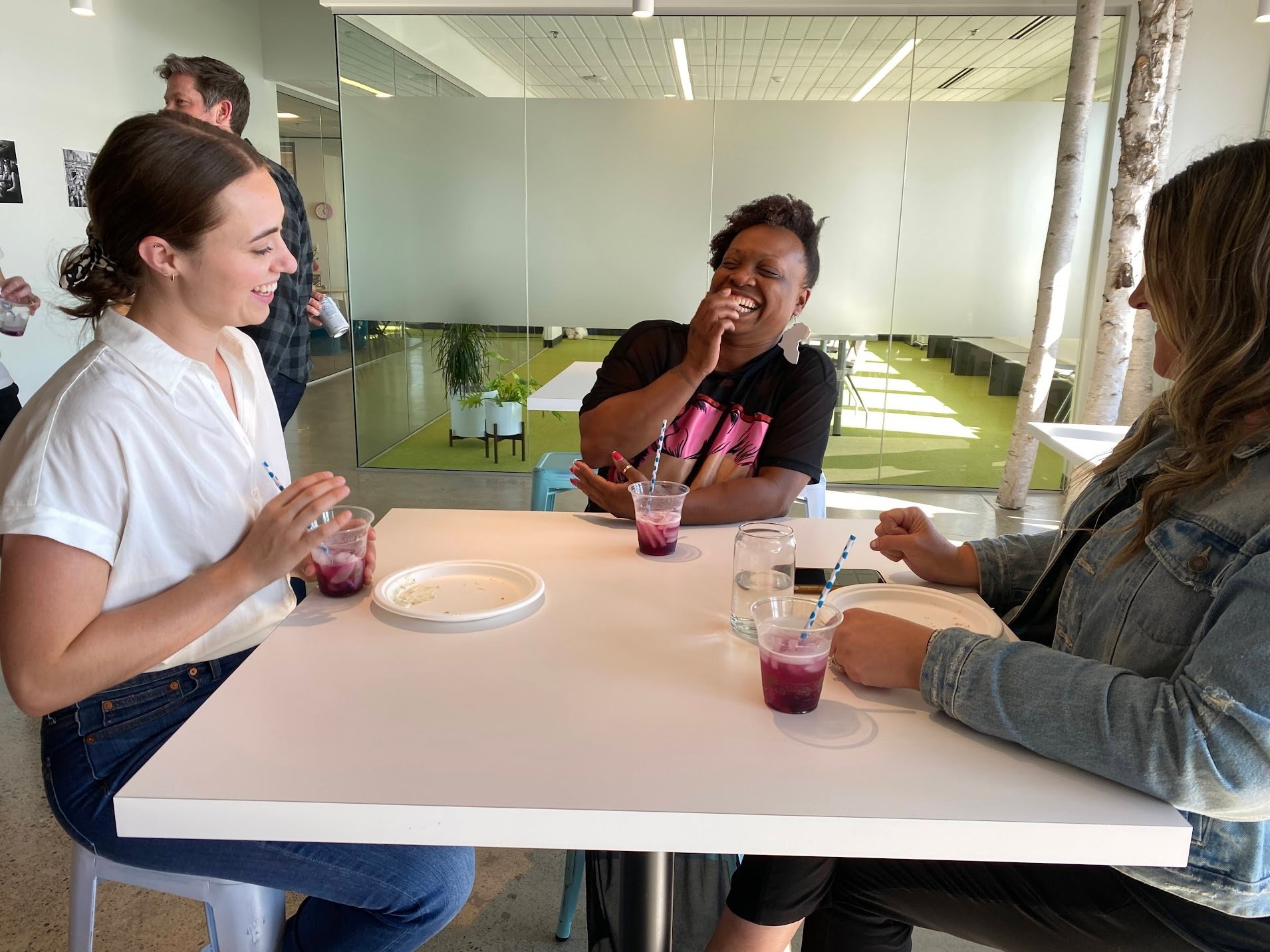
Blink has values rooted in a deep commitment to the people we serve. Our mission is to enrich people’s lives — the lives of our employees, our clients, their customers, and the people in our communities.
Like so many other companies last year — in the wake of the killings of George Floyd, Breonna Taylor, and Ahmaud Arbery — we sat down to take a long, hard look in the mirror.
Our leadership team hosted diversity, equity, and inclusion (DEI) forums for employees to come together to discuss where we were as a company and where we needed to improve. We realized we had some significant gaps in our collective understanding of the impact that systemic racism has on our company culture and the Blink community. We then began to educate ourselves further and find ways to address systemic racism in a meaningful way — not only because it was the right thing to do but also because it would make us a stronger company. This article shares the beginnings of our roadmap to a more inclusive and diverse workplace.
Our commitment
Blink is committed to creating a more just and equitable world through our company culture and the work that we do. The following five initiatives are a part of this commitment.
1. Creating safe spaces to work
We provide all Blink employees with a safe workplace to share thoughts, concerns, questions, and ideas regarding diversity, equity, and inclusion, without repercussions. Beyond listening carefully to our employees, we take all ideas into consideration, so we have diverse viewpoints that make us more innovative, actionable, and therefore more impactful.
Here’s how we are creating safe spaces to work:
- We provide avenues for people to speak up and share ideas. We make it clear that raising concerns will not impact anyone’s job.
- Once a month, our HR team hosts a companywide forum for our employees. This is a time for our teams to come together to discuss important topics in a safe, open space regarding various aspects of our work, including diversity, equity, and inclusion.
- We have a Slack channel devoted to topics in the DEI space. This channel is used to support each other, share ideas, and encourage action in support of DEI efforts in our fields of design, research, tech, and beyond.
2. Establishing inclusive hiring practices
We work to bring greater objectivity to our hiring process by identifying and reducing bias — conscious and unconscious — and taking time to ensure we interview a diverse pool of candidates for every role.
Here’s how we are making our hiring process more inclusive:
- Employees involved in our hiring process are required to complete interviewer training. This two-part training covers inclusive hiring practices and ways to minimize unconscious bias during the interview process.
- We know that there’s a lack of racial diversity in the tech industry, and Blink is not an exception, with 64% of our company identifying as white. As a data-driven company, we measure our progress — including our recruiting efforts — to understand where we need to improve with race, gender, sexual orientation, age, personality, expertise, and education, among other variables.
- Considering a diverse group of people for each role at Blink has become an important focus for our company. As a result, we expanded our recruiting team to ensure we have the time and expertise needed to find diverse pools of candidates for each open position.
We reviewed each step of our interview process through a DEI lens to determine our opportunities for improvement, which led us to establish:
- A standardized interview guide that includes key needs for each position, our interview goals, and a list of consistent, predetermined interview questions.
- A new feedback questionnaire for the interviewers to ensure everyone on the hiring team has time to thoughtfully process their feedback for each candidate privately before meeting with others on the hiring team.
- A commitment to continued transparent pay ranges for employees, which helps us keep pay equity at the forefront of our hiring practices.
3. Prioritizing inclusivity in the workplace
We are taking action to create more equitable and inclusive work processes across the company. We encourage feedback from employees on our current methods and hold each other accountable to stand against racism, sexism, ageism, and all forms of bias in the workplace.
Here’s how we are prioritizing inclusivity in the workplace:
- Our core value at Blink is authenticity. Employees encourage each other to bring their whole selves to work each day to build a vibrant, creative, and inclusive company.
- A clear and equitable process for employee growth at Blink is a vital aspect of our inclusive culture. We have developed detailed “skill tracks” which include salary bands for each level of employment. Our practitioners work within this promotion system that clarifies the skills they need to develop, in order to advance their career and earn a promotion.
- We understand that each employee has a different set of goals and strengths. To ensure each employee has adequate, one-on-one support time from their manager, managers have no more than five direct reports at a time.
4. Educating ourselves
Every day, we find opportunities to educate ourselves and each other on diversity, equity, and inclusion. We know that only through consistent growth and development can we maintain our commitment to excellence in both our work outcomes and in our relationships.
Here’s how we are improving our knowledge of diversity, equity, and inclusion:
- One of our DEI subcommittees delivers a newsletter to employee inboxes quarterly. This newsletter focuses on educating employees on DEI topics while also elevating the voices of historically marginalized people.
- We host companywide events, such as Juneteenth programming, to lead educational programming — such as watching a film together or reading a book about the Black experience, followed by a facilitated group discussion. Our Blink Book Club is another opportunity for employees to explore new perspectives and discuss topics such as race, belonging, and equity throughout the year.
- Every employee at Blink is required to complete unconscious bias training upon hire. This helps employees recognize where bias can affect the workplace and gives them tools to combat bias to create a more inclusive environment.
5. Engaging our clients and community
We know that we can effect positive change through the products we help our clients design. In addition, we look for ways to provide counsel and mentorship by partnering with organizations in our communities that create avenues to inclusive design, UX, and STEM. We are banding together with other like-minded organizations to increase the diversity of practitioners within our field and our region.
Here’s how we are working with our clients and community to address systemic racism:
- We’ve drafted an anti-racist roadmap for user-centered design projects that works to dismantle structures and norms that uphold racist inequity within our design, research, and project management practices. The roadmap includes ensuring BIPOC inclusion in research participants, looking at how we staff our teams on project work and reviewing US/Western methodologies that influence our design.
- We launched our pro bono project program in summer 2020 to extend our expertise to companies in need of UX services that may not have the financial resources necessary to hire consultants. We commit to working with BIPOC founders who seek to create innovative solutions for society’s most pressing issues.
- In 2020, Blink joined the Anti-Racism in Tech Pact, led by the Washington Technology Industry Association. Its goal is to help companies in the technology industry address systemic racism in a meaningful way.
- We extend our resources to organizations in the community that work to make a positive change in the DEI space. Organizations we have supported in the past include We Tha Plug, San Diego Experience Design (SDXD), Hexagon UX, and the AIGA Changemaker Series. We are always looking for new organizations to support, whether by hosting an event in our space, sponsoring them financially, or elevating their voices in our annual conference, Convey UX.
Why commitment to DEI is important to us
To achieve our company mission — to enrich people’s lives — we must celebrate and represent different races, ethnicities, genders, sexual orientations, abilities, ages, identities, and backgrounds. We must amplify the voices of historically underrepresented people in our workplace and in our work. Throughout all we do at Blink, we champion authenticity and uniqueness.
We believe a supportive and inclusive work environment is the key to a positive culture where people can come together to do their best work, find purpose, and, as a result, have more energy to be fully engaged with their families and communities.
Our clients and their customers are from around the world and represent a robust range of diversity in the human experience. To meet their diverse and changing needs, we have an obligation to improve old processes and practices, as well as introduce new ones that help us create a more just and equitable world through our work and our people.



